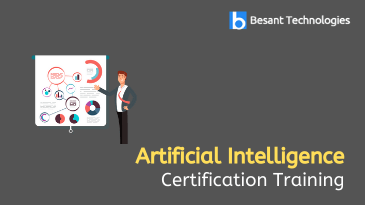As Artificial Intelligence is impacting the future of every industry and every human being, there is a rise in a huge number of job opportunities based on Deep Learning, Machine Intelligence. Completing AI has evolved into the employee support system as it improves communication, completes tasks faster for better outcomes within less amount of time. AI is becoming more efficient when compared to manual methods, this is resulting in plenty of job opportunities in Mumbai. There is no need for programming skills to learn Artificial Intelligence, who are interested in pursuing this course can enroll for it. We all know that AI is going to rule the world in the future. So, let’s not wait for the chance, get enrolled in Besant technologies Artificial Intelligence training in Mumbai to build your bright career.
Course Content
Introduction to Deep Learning and Neural Networks
Deep Learning is considered as a mimic of the human brain. It is the branch of Machine Learning that is completed based on Artificial Neural Networks. Most of the times Deep Learning makes use of neural network algorithms. Neural networks are considered as an artificial human nervous system for receiving, processing, and transmitting information in terms of Computer Science. Introduction to Machine learning, need of Deep Learning in Artificial Intelligence, Introduction to Neural Networks and its importance in Artificial Intelligence, How Deep Learning is different from Machine Learning, core concepts of Deep Learning, core topics of Machine Learning, supervised learning and unsupervised learning, key benefits of Machine Learning and Deep learning, Statistics fundamentals, and various methods of Machine Learning.
Deep Learning libraries
Deep Learning libraries are created to provide quality and pre-written code for the users to use for the development of their own projects. Introduction to Deep Learning, need of Deep Learning in Artificial Intelligence, working of Deep Learning, introduction to TensorFlow and its importance as a library, Use of TensorFlow to create, design, and train models of Deep Learning, Understanding of Google’s TensorFlow Processing Unit, Python libraries, Introduction to Theano, understanding of Keras and use-case its implementations, data visualization, PyTorch library operations, prototyping, how Deep Learning libraries help users in understanding the in-built code, advantages of using Deep Learning frameworks and libraries.
GPU in Deep Learning
GPU is abbreviated as Graphical Processing Unit, it is considered as the central unit/heart of the Deep Learning. Graphical Processing Unit acts as a Single chip processor that is mainly used for extending the mathematical and graphical computations. Basic understanding of Deep Learning, Importance of GPU in Deep Learning, how is this Graphical Processing Unit different from Central Processing Unit, Implementation of both CPU and GPU in TensorFlow, why GPU is faster than CPU, bandwidth variations in both GPU and CPU, advantages of GPU over CPU, How GPU helps in training the Deep Learning Networks, and what are the implementations and functions of GPU in Deep Learning.
Deep Learning Applications
In this section, you will get to a wide variety of Deep Learning applications in various fields. Deep Learning in computer vision, computer games, pattern recognition, self-driving vehicles, Use of Deep Learning in the creation of arts, video analytics, image recognition, speech recognition, Computer hallucinations, predictions, use of Deep Learning in Natural Language Processing, and image processing.
Artificial Neural Networks and Various Methods
Neural networks are considered as an artificial human nervous system for receiving, processing, and transmitting information in terms of Computer Science. These Artificial Neural Networks are inspired by biological neural networks to perform and think the same as that of the human and animal brains. How the tasks are performed in a linear manner using Artificial Neural Networks, how these artificial neural networks will handle the missing data, regression techniques, optimization techniques, gradient descent rule, various methods of artificial neural networks that are used to training, understanding of perceptrons, Neural Network Bias, Activation functions, architectures of artificial neural networks, and understanding of Deep Neural Networks.
Convolutional Neural Networks (CNNs)
Convolutional Neural Networks are considered as a class group of Deep Neural Networks in Deep Learning. These Convolutional Neural Networks are also named as space invariant artificial neural networks. Shift invariant artificial neural networks are used mainly in analyzing visual imagery. Introduction to Deep Learning, understanding of various deep neural networks classes, gain in-depth knowledge about Convolutional Neural Networks, architectures of shift-invariant artificial neural networks and its use cases, pooling layers, implementation and deployment of convolutional neural networks in TensorFlow, and advantages of using convolutional neural networks.
Multi-layered Neural Networks
A multi-layered neural network is defined as a network that consists of more than one layer of artificial nodes or neurons. These networks significantly differ mainly in design. Most of the organizations instead of using single-layer neural networks started using multi-layered neural network models for deploying various applications. In this module, you will get to know in detail about the architecture of the multi-layered neural network, comparison between single-layer neural network and multi-layered neural networks, deployment of multi-layered neural networks in TensorFlow, activation functions in neural networks, hyperbolic functions, understanding of perceptrons in multi-layer neural networks, knowledge about logic gates, and advantages of using multi-layered neural networks.
Recurrent Neural Networks (RNNs)
A Recurrent Neural Network is also considered as a class of Artificial Neural Networks. In this network, the connection between the nodes is established and then after it forms as a directed graph in a temporal sequence. Recurrent neural networks allow users to exhibit the temporal dynamic behavior of the nodes. In this networking sequence, the output of the early step acts as the input for the current step. Introduction to recurrent neural networks, various models of this network, Recurrent neural network use cases, understanding of RNN cell, implementation and deployment of recurrent neural network in TensorFlow, the theory of recursive neural Tensor Network, time-series predictions, various modeling sequences, understanding of unfolded RNN, and advantages of Recurrent Neural Networks.
Keras API
Keras is one of the high-level neural networks API. This API code is written in Python programming and it also has the capability of running on the top of Theano, CNTK and many more. The Keras functional API provides an alternative way of creating models that offer flexibility. Keras library provides an interface for approaching Deep Learning. Composing models using Keras, functional and sequential composition, process customization, and how to deploy Keras with TensorBoard.
Chatbots
A chatbot is software in Artificial Intelligence that is mainly used to arouse the conservation via natural language processing in the form of textual methods. These chatbots are also known as conversational agents and are used for establishing connection or interaction with the real person. In this section, you will get to know the introduction of Chatbots, architecture of chatbot, specifications of chatbots, which type of algorithms are used in chatbots, various chatbot functions, different types of chatbots, how to create a hangouts chatbot, creation of chatbots, understanding in detail about specific concepts of chatbots like entities, context, and intents, NLU algorithms, Open-closed domain bots, and advantages of using chatbots.
TFLearn API for TensorFlow
TFlearn is a library that is built on the top of the TensorFlow. It is a very transparent and modular deep learning library mainly designed to provide high-level API to TensorFlow. In this module, you will learn in detail about how to implement neural networks using TFlearn API, understanding of TensorFlow Deep Learning Library, deployment of TensorBoard, and composing various models.
Autoencoders and Restricted Boltzmann Machine (RBM)
An autoencoder is defined as a type of artificial neural network that is used especially to learn data codings in an unsupervised manner. The main goal of the autoencoder is to learn in detail about the representation of a set of data. Restricted Boltzmann Machine (RBM) is also considered as an inventive stochastic artificial neural network and its main aim is to learn the probability distribution over different input sets, understanding of autoencoders, key features of autoencoders, applications of autoencoders, usage of RBM for collaborative filtering, and deployment of Restricted Boltzmann Machine for deep neural networks.
CERTIFICATION
The whole world is revolving around Artificial intelligence, and it is the trending technology that is transforming many industries globally. Besant technologies offer Artificial Intelligence courses that will empower you to become a skilled AI professional with in-depth knowledge of AI aspects including TensorFlow, Machine learning, Deep learning, and many more. There are many organizations hiring AI certified professionals in the world. So, there is an increased demand for Artificial Intelligence certification in Mumbai. People around the world will be astonished by watching how rapidly the emerging trend for Artificial Intelligence is increasing.
Certification plays a major role in building one’s career as a professional with excellent skills in a particular field/technology. So most of the aspirants who have a keen interest in only one field will join the training in some courses to gain expertise in core areas and get job opportunities for the most demanding technologies. Having a certification in a particular course or technology will add value to the resume of an individual and recruiters will have a positive opinion on him that he is only specific to that particular field and we need that skill. Getting enrolled in the Artificial Intelligence course in Mumbai offered by Besant technologies will help you build your career in Machine Intelligence. During this training period, you will master all the core concepts of the AI and get placed in the top MNCs












